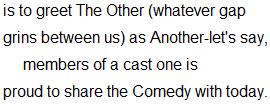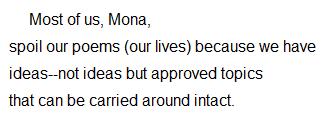Trappings by Richard Howard. Turtle Point Press, 1999. 81 pp. $14.95 paper.
As Reviewed By: Preston Merchant
Richard Howard is the high priest of the most secretive sect of the cult of art, one that, sheltered from the rude gaze of public scrutiny, seeks to reward only the initiate. In his now infamous remarks at the 1996 PEN Literary Awards, he decried the commodification of poetry into National Poetry Month as surely “one of the worst things ever to happen to poetry.” He avowed,
If we are to save poetry, which means if we are to savor it, we must restore poetry to that status of seclusion and even secrecy that characterizes only our authentic pleasures and identifies only our intimately valued actions.
Such is not a new or remarkable stance, but Howard offers himself as a counterweight to Robert Pinsky’s breakneck and publicly funded attempts to make poems as commonplace as the morning newspapers (or perhaps a better figure, given Pinsky’s enthusiasm for technology-to make poetry as pervasive as those AOL CD ROMs that appear weekly in everyone’s mailbox). The irony is that, after the nation’s poet laureate, Howard is poetry’s most public figure–as poetry editor of the Paris Review and the Western Humanities Review, professor at Columbia, selector of manuscripts for various presses, frequent lecturer at conferences and universities, and tireless champion of a growing number of struggling and established practitioners of the art.
Howard believes that poetry should indeed be a secret, not available for general consumption. Its value should lie in the very fact of its unavailability (simple supply-and-demand economics). This is a difficult stance for a poet today, as poetry struggles to find its place in our culture, and one might argue that only a prominent poet like Richard Howard could get away with it. Part of the apparent secrecy for Howard is his concern with the gaze of poems upon other works of art, including other poems. Though he occasionally takes up a subject from the realm of the politically correct, there is little that is merely socially critical or multicultural about his work–or, better said, his criticisms are far more sophisticated than the usual claptrap of today’s politically conscious poetry. Refusing to be judged as a gay or Jewish poet, Howard is openly hostile toward attempts to evaluate art by anything except aesthetic criteria. In many ways he is our most conservative poet.
His latest collection, Trappings, as concerned with art as any of his previous books, explores the nature of artifice itself. Howard’s poems construct a series of lenses, like a medieval microscope, to view his subjects. Those lenses are poems that view paintings that view poems–so much focus and reflection on what has been “trapped” in the eyepiece. Ten of the poems here are direct responses to paintings or sculpture; others refer generously to other poems and poets, past and present (including Milton, Browning, Frost, Elizabeth Bishop, Mona Van Duyn, and Muriel Rukeyser). Howard examines what is held for us in the trust of Art in order to clarify it, negate it, champion it, or offer a different perspective on it. As his speaker says in “Avarice 1849: A Distraction,” a photographer attempting Balzac’s portrait, “Indulge / my lens but one more moment, then / you may correct my views as wisdom sees fit.”
What saves Howard’s work from being esoteric is his generosity and emotional range. Not merely aesthetic divagations, Howard’s poems engage the human by whatever means they can. “The Manatee,” for example, stands in dialogue with poems by Frost and Bishop about strange, revealing encounters with the natural world-other beings in animal guise-and reaches a conclusion borne as much out of aesthetics as from basic, universal desire. “Our great / human hope . . .”
Howard’s generosity lies in recognizing that the “gap” between the speaker and the manatee is essentially benign, not like a partition or a hyphen, separating disparate elements. He arrives at this conclusion partly through a linguistic observation. Manatee and emanate are anagrams: “no other verb could state / so well the means of its apparition.” When human understanding is applied, the manatee’s nature becomes one of reaching out, and for Howard the great human comedy (the tale with the happy ending) should gather everything in. This stance is the substance of his dictum in “For Mona Van Duyn, Going On”:
The “possession of wisdom,” he adds, should be renounced for the “power to observe.” Such recognition is the first task for Howard’s reader-initiate, as it is key to his approach to art.
Not everything, however, is so sweet. “Dorothea Tanning’s Cousins,” for example, is a fine meditation on desire and familiarity and their dark opposites (or are they themselves dark?). Howard sees in the abstract, mixed-media sculpture (reproduced on the book’s cover) a couple “melting / together yet somehow sadly apart, / orifices certainly unmatched to / protuberances.” They embody a play of tyranny and submission, each alternating (or surrendering) to these roles, the one truly becoming the other in all aspects. Though Howard calls them he and she, since the sculpture is abstract, it is not clear which figure is which. The viewer-reader can shift them in his mind. The goal of their embrace, much like the goal of religion or art, is to reach that “pitch of expertise / when the thing seen becomes the unseen thing”–when the practitioner’s skill becomes the vehicle of revelation for the faithful. Howard’s conclusion:
This is as political a poem as any. The ending questions the grounding of relationships, loyalties. The cousins are enemies because their forces are in opposition to each other, but are they themselves so different? Is coming together that which drives them apart? Which of their multiple relationships should hold sway?
Howard’s focus is always the nexus of life and art. It is not enough to say that one simply is the other (though he often does). The two participate fully in each other-feeding, deriving identity and pleasure, quarreling, and ultimately sustaining each other, like a pair of lovers. The relationship is as messy as it is beautiful, yet how could one exist without the other? Or wish to?
Based on a series of paintings that show the blind Milton dictating Paradise Lost to his daughters, “Family Values” is his most extensive treatment of this theme. The perspective is one of many removes-a poem about a painting of a biographical scene made famous only because its subject has written a great poem. Howard’s poem is comprised of the voices of the daughters and letters between art dealers and collectors, gallery owners and professors. Though the air might seem a bit rarefied, Howard explores the nuances of these relationships, finding the tender (if often resented) affection the daughters have for their father side by side with the petty, opportunistic dealings of the art world. Howard is keen to show that the legacy of a work of art like Milton’s poem (how it has become known to the wide world) is unavoidably a story of human relationships.
“The Job Interview” likewise explores the messy business of propagating such a legacy. Presenting himself in 1957 to André Breton to translate Nadja, Howard faces “the danger”: “Breton’s legendary loathing of queers.” Howard struggles with Breton the artist and Breton the man-uselessly or successfully, it is difficult to tell: “Nadja in English / is still in print, and people still hate queers.” His only solace is Breton’s own words, written to his wife, “criticism will be love, or will not be.”
Poetry, too, will be love, or will not be. The dark and hidden, that which is revealed by a change of perspective or from a distance, the metaphysical nature of human relations as revealed through the lens of art–Howard knows that refining his power to observe such secrets is truly the rarest act of love.








